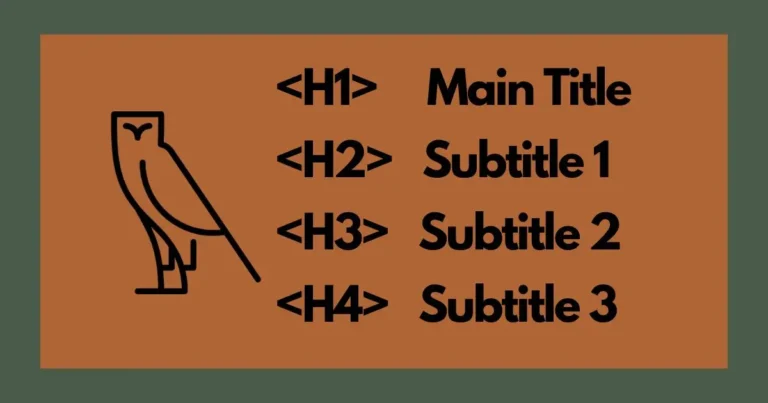Importance of Headings in SEO
Headings in SEO play a critical role by means of structuring your content material for both engines like google and readers. Whether you’re writing a blog, an editorial, or an internet replica, expertise in the way to use headings correctly can improve your site’s rating and provide a better person experience.
TABLE OF CONTENTS:
- Why Are Headings Important for SEO?
- Improved Readability and User Experience
- Keyword Optimization
- Content Hierarchy and Structure
- Featured snippets and voice search
- About Mobile SEO
- Best practices for using headlines in SEO
- Common mistakes to avoid
- conclusion

The Importance of Headings in SEO: A Comprehensive Guide
What Are Headings in SEO?
Headings in SEO are HTML factors that arrange content into sections. They variety from <h1> to <h6>, with <h1> being the maximum vital and <h6> the least. Each heading degree represents a hierarchy inside the content material structure, making it easier for customers and search engines to apprehend the context and waft of facts.
Why Are Headings Important for SEO?
- Improved Readability and User Experience
Headings in SEO wreck your content material into digestible sections. They help readers quickly test your web page, discover key points, and discover the information they’re searching out. A well-structured article encourages customers to stay longer to your web page, reducing bounce prices—a key rating aspect.
- Keyword Optimization
Search engines use headings to decide the topic of your content. Including relevant key phrases in headings can enhance your web page’s visibility for targeted search queries. However, keep away from key-word stuffing, as it can negatively effect your scores.
- Content Hierarchy and Structure
Headings offer a clean hierarchy, making it simpler for search engines like google and yahoo to understand your content’s company. For example:
- <h1>: The principal identity of the web page.
- <h2>: Subtitles or fundamental sections.
- <h3>: Subsections within <h2> subjects. This logical structure ensures that your web page is crawled and listed effectively
- Featured snippets and voice search
Properly structured subject lines can increase the chances of being found in the featured snippets of your content, which are key real estate in search results. They also improve compatibility with voice search, as virtual assistants tend to pull answers from well-organized resources.
- About Mobile SEO
A streamlined page layout with titles with Google’s mobile-first indexing ensures a positive experience for mobile users. The themes allow seamless access to the small screen.
Best practices for using Headings in SEO
- Use only one <h1> per page The <h1> tag should be the main title of your page. It should clearly define the title and include your keyword.
- Follow the logical sequence and maintain proper order. Do not jump from <h2> to <h5> without a break.
- Include Keywords Strategically Use natural keywords in your titles, especially in the <h1> and <h2> tags, but avoid overloading them with keywords.
- Keep the title short Make sure your title is clear and relevant. Long, wordy titles can confuse readers and ruin relevant keywords.
- Optimize for Accessibility The theme also increases web accessibility, helping screen readers understand the content structure. Compliant with the Web Content Access Guidelines (WCAG).
- Use titles to answer user questions Create a title for frequently asked questions or set up search ideas to match your content to user needs.
- Skipping levels: Avoid jumping from <h1> to <h4> directly.
- Overuse of titles: Do not use too many titles unnecessarily, as this can clutter your content.
- Ignore Style for Function: Don’t just use themes for styling; Their primary purpose is physical organization.
conclusion
Headlines in SEO are more than just organizing tools—they’re essential to SEO success. By providing structure, improving readability, and optimizing for search engines, headlines can dramatically improve your site’s performance. When used properly, it not only boosts your ranking, but also creates a seamless experience for your readers.
Focus on creating meaningful headlines with plenty of keywords that will guide your audience and search engines. After all, a well-structured page is the foundation of great SEO.